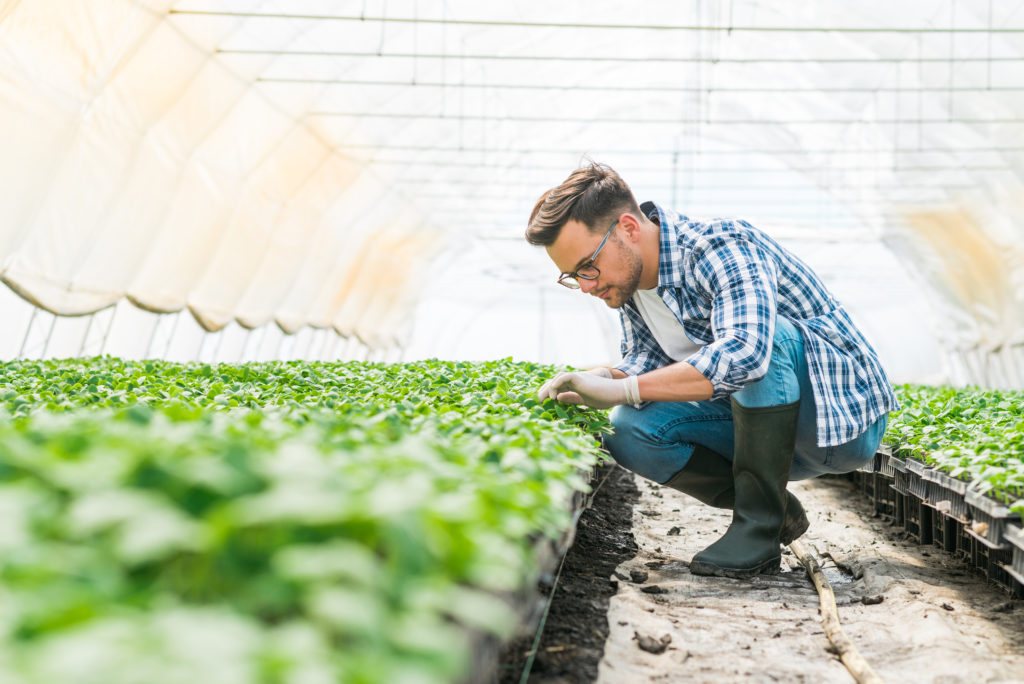Get the Facts: How Organic Farmers Control Weeds & Pests Without Genetic Modification




Organic farming relies on natural practices like promoting biodiversity and using natural nutrition sources. It probably isn’t surprising that the Canadian organic standards prohibit the use of seeds that have been genetically modified in labs for crop farming.
Using non-modified seeds means organic farmers have to double up on other methods for fighting pests and weeds in their crops. It’s often a greater challenge, but it’s one that farmers, like Ryan Mason, are prepared to take on.
Ryan Mason owns Reclaim Urban Farm, a multi-generational farm in Pigeon Lake, Alberta. He has a strong background in agriculture that extends from his early roots on the family farm to a Master’s in Environmental Sociology. For a time, Ryan ran Reclaim Urban Farm in the heart of Old Strathcona, farming in “borrowed” garden beds and empty lots near Whyte Avenue. About a year ago, he had the opportunity to take over the family farm, and he did just that.
Ryan’s farm grows mostly vegetable crops and microgreens (which are grown indoors in a greenhouse), as well as flowers. He spends a lot of time at local markets in Edmonton, and his produce can be found in popular organic shops like Blush Lane and Planet Organic, as well as the Organic Box. Ryan has a great deal of experience in natural weed and pest control methods, so we asked him how he manages unwanted guests in his vegetables.
Ryan says genetically modified vegetable seeds are rare, but it is common to find genetically modified grain crops. In most cases, genetically modified plant species are created with a specific purpose in mind, such as weed or pest control, or better growing abilities in certain climates or regions. These modifications can improve the quality and quantity of the crops grown.
Organic growing processes are built on natural methods of farming. It is one of the reasons why the Canada organic standards ensure organic farmers use non-engineered seeds for their crops. Without added help from synthetic pesticides, and without pest and weed-resistance built into engineered seeds, organic farmers have to find other ways to address these common issues.
By promoting weed or pest-resistant strains of crops, genetically modified seeds cut out some of the work involved in protecting crops and keeping them healthy. Since certified organic growers cannot use genetically modified seeds, they have to rely on age-old farming practices. Most of these methods of growing are more manual and labor-intensive, but they can be extremely effective when they’re done the right way.
Crop rotation, cover crops, and other weed management techniques, like mulching, help both conventional and organic farmers control weeds in their crops. However, organic farmers must rely solely on these practices while conventional farmers have the option to use herbicides. A small number of herbicides are technically permitted by the Organic Production Systems Permitted Substances List, but most organic farmers will turn to natural organic practices first, or use a combination of these options.
Insect pests can be more complicated. For vegetable farmers, cloth covers are one of the best ways to prevent pests from settling in. Ryan uses row covers, which are made with cloth netting that allows sun and water in, while blocking most of the standard prairie pests he finds hanging around his vegetables. The row covers don’t always protect the plants directly, but at the very least, they prevent predators from flying in and laying eggs.
Farmers can also bring in natural predators to help manage their most bothersome pests. Some include other species of insects and even a few types of bacteria. Ryan uses bacteria to ward off the cabbage moth, which feeds on many types of vegetables, fruits, and other crops – not just cabbage. Another option Ryan uses is putting diatomaceous earth around some of his plants. This is a mixture of crushed seashells that feel coarse and jagged to beetles and slugs, but is completely safe for people and other animals.
However, each pest control method comes with its own challenges. Diatomaceous earth needs careful timing because it can’t get wet. Farmers have to know how and when to use tools like bacteria. In other words, a lot of research and word-of-mouth knowledge needs to be passed on through the organic farming community. For organic crop farmers with large fields, pest and weed control must be carefully planned through crop rotations and other farming techniques. It’s no easy task, but it’s one all organic farmers have to take on.
Ryan says many of his neighbours use genetically modified seeds and they have good reason for it, because it helps them grow high yielding, high-quality crops. All Canadian farmers strive to produce safe, high-quality nutritious food. Whether or not you eat food grown from genetically modified seeds is a matter of personal preference.



Disclaimer: Opinions expressed in this document are those of the author and not necessarily those of the Governments of Canada and of Alberta. The Government of Canada, the Alberta Ministry of Agriculture and Forestry, and its directors, agents, employees, or contractors will not be liable for any claims, damages, or losses of any kind whatsoever arising out of the use of, or reliance upon, this information.
![]() More Get the Facts
More Get the Facts
Apr 9 | Get the Facts
This article was written prior to the tragic passing of Cathy Halonen, and is being published in remembrance of her. Her passion and dedication to o
Read MoreMar 30 | Get the Facts
Walking through grocery stores, you’ve seen food with marketing phrases like “all-natural," “sustainably grown," “pasture raised," “hormon
Read MoreJan 14 | Get the Facts
There’s no doubt about it: antibiotics are life-saving medications that play an important role in the lives of humans and animals alike. They’
Read More